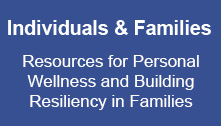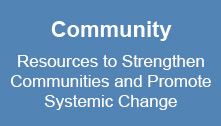|
Physical and Mental Health
Health Care
The resources included in this section are particularly relevant for professionals working in the field of health care. Mental health professionals and other professionals who work in hospital or clinical settings and public health professionals may also find these resources relevant to their work.
|
|
Post-Secondary Education
The links in this section include resources particularly relevant for professionals in post-secondary education. |
|
Family Support
This section is relevant for family support professionals and other professionals who work with families, particularly families with young children.
|
|
Business
These resources are relevant for leaders in the business industry, professionals in human resources and management-level professionals interested in improving or maintaining positive work environments.
|
|
Faith-Based Groups
This section is for leaders of faith-based groups or organizations interested in developing a faith-community response to adverse childhood experiences (ACEs) and traumatic stress.
|
|
Child Welfare
The links included in this section are intended to inform human service professionals, foster and adoptive parents, and other professionals and individuals working in or involved with the child welfare system.
|
|
Substance Abuse
The resources in this section are for professionals who promote substance abuse prevention or treatment or for professionals who address the impact of substance abuse on individuals, families or communities.
|
|
Child Abuse Prevention
The links in this section are for professionals who promote child abuse prevention or who work to prevent child abuse in families, communities or society.
|



















